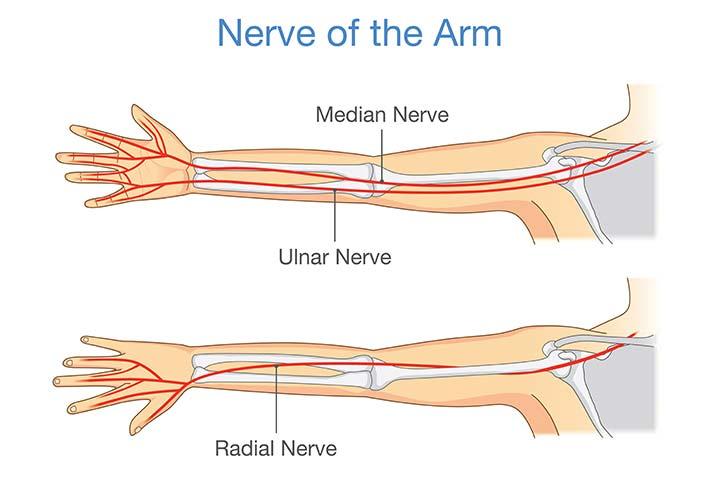What Is What Is the Funny Bone Called

Image: Shutterstock
The funny bone in kids is the part of the elbow that produces a weird tingling sensation when accidentally bumped against something. Children often hit their elbows and experience sharp pain or a jolt of electricity running through their arms. Although it hurts, the pain in temporary.
However, if your child faces difficulty moving their arms or the pain and tingling sensation continues for a long time, it may indicate other issues. In such cases, consult a pediatrician.
Read on to understand more about the funny bone, the origin of the name, why it hurts so much, and how to differentiate it from other causes of tingling sensations in the arms.
What Is The "Funny Bone"?
The funny bone is not a bone; it is the part of the ulnar nerve on the back of your elbow and rests against the upper arm bone called the humerus in the elbow. The ulnar nerve originates from the brachial plexus (a network of nerves) in the spinal column (1).
Image: Shutterstock
The ulnar nerve provides motor innervation to the parts of the forearm and hand that help move the muscles. The medial side of the forearm, medial wrist, ring finger, and little finger receives cutaneous sensory innervation from the ulnar nerve.
Why Is It Called A "Funny Bone"?
There are two theories why the ulnar nerve in the back of the elbow is called the "funny bone." Firstly, the name can be a pun since the name of the upper arm bone "humerus" sounds similar to "humorous." The name could also be due to the peculiar sensation experienced when you bump it into something (2).
Why Does The "Funny Bone" Hurt?
In the elbow, the ulnar nerve lies between the skin and the fat tissue, and the bones do not protect it. Thus, you could be more vulnerable to injuries at this location. When you hit your funny bone, the nerve is stricken and also gets compressed against the bone. Even a small strike on the funny bone can cause pain, numbness, and tingling sensation in the forearm and fingers (3).
Although the elbow is bumped, the tingling sensation can be felt along the course of the ulnar nerve. The strange sensation and pain usually disappear without any complication in most people.
Clinical Significance Of The Ulnar Nerve
An injury to the ulnar nerve at the elbow and wrist can cause the motor and sensory loss of the arms and fingers. The degree of functional loss may depend on the severity of the injury. Trauma, cuts on the wrists, and cyst in the Guyon's canal (ulnar canal) in the wrists are common reasons for ulnar nerve injuries (4).
Ulnar nerve injuries may cause an inability to grip objects with fingers, and long-term injuries could cause problems, such as ulnar claw hand deformity. The following syndromes can develop due to the entrapment of the ulnar nerve.
- Cubital tunnel syndrome occurs when there is compression or stretching of the ulnar nerve in the elbow region. This may cause pain and a sensation similar to hitting the funny bone, but the symptoms last longer and often feel severe (4).
- Guyon canal syndrome occurs when the ulnar nerve compresses within the Guyon canal or ulnar canal, a canal in the wrist through which the nerve passes. This may cause symptoms such as pins and needles in the ring and little fingers. Overuse of wrist, excessive weight lifting, and trauma are some of the significant causes of this injury (5).
The carpal tunnel syndrome due to median nerve injury may have similar symptoms. Children may not be able to explain the symptoms or the events of injury adequately, and it can be challenging to differentiate between nerve issues. It is recommended to seek expert help for the diagnosis and treatment of nerve injuries.
Signs And Symptoms Of Ulnar Nerve Injury
Knowing the clinical features of ulnar nerve injury could help you differentiate it from self-recovering issues, such as a funny bone hit.
You may notice the following signs and symptoms in ulnar nerve injury (4).
- Pain, numbness, and tingling sensation of the arm
- Sensory loss in the joints of the ring and little finger
- Inability or discomfort while folding thumb and fingers
- Clawing of the ring and little finger
- Loss of muscular bulge on the hand
- Flattening of the medial forearm area
When To See A Doctor
Bumping the funny bone has an impact for a short duration, and it usually gets better on its own. However, if you notice any other symptoms of sensory or motor function impairment in the arm, consult a doctor.
Pain, numbness, and tingling sensation lasting for long could be due to ulnar nerve injuries that require medical care. Doctors can diagnose nerve injuries by assessing the functions of the nerves.
Hurting the funny bone is common for kids as they move around from here and there or while playing. But the tingling sensation of hurting that region is weird and can also have a numbing feeling as the nerve is right beneath the skin, unprotected by a layer of fat. Thus, we have prepared this list of interesting facts about the funny bone for kids that you can share with them. You can also make jokes and puns related to it to make your conversations interesting and fun.
Key Pointers
- The funny bone, a nerve, is the reason behind the tingling sensation when we accidentally hit our elbows.
- A blow to this ulnar nerve causes severe, temporary pain and numbing of the fingers.
- The ulnar nerve injury could cause Cubital Tunnel syndrome and Guyon canal syndrome.
- Visit a doctor if the tingling sensation or the numbness lasts longer.
References:
MomJunction's articles are written after analyzing the research works of expert authors and institutions. Our references consist of resources established by authorities in their respective fields. You can learn more about the authenticity of the information we present in our editorial policy.
The following two tabs change content below.

Dr. Neha Bhave Salankar is a consultant psychiatrist at Bhave Institute of Mental Health based in Nagpur. Having been a meritorious student throughout, she bagged the prestigious gold medal for medicine in MBBS as well as in MD psychiatry. She also took training in Child and Adolescent Psychiatry at National Institute of Mental Health and Neurosciences (NIMHANS), Bengaluru. She is... more

Dr. Bisny T. Joseph is a Georgian Board-certified physician. She has completed her professional graduate degree as a medical doctor from Tbilisi State Medical University, Georgia. She has 3+ years of experience in various sectors of medical affairs as a physician, medical reviewer, medical writer, health coach, and Q&A expert. Her interest in digital medical education and patient education made... more
matthewsgotin1978.blogspot.com
Source: https://www.momjunction.com/articles/funny-bone-facts-information-kids_00649593/

0 Response to "What Is What Is the Funny Bone Called"
Post a Comment